Iranian authorities yesterday prevented the family of Mahsa Amini from holding a ceremony to commemorate the first anniversary of her death, confining her father to his home after briefly detaining him, rights groups said.
Amini, a 22-year-old Iranian Kurd, died a few days after her arrest by religious police for allegedly contravening the strict dress code for women in force since shortly after the 1979 Islamic Revolution.
Her family says she died from a blow to the head, but that was disputed by Iranian authorities.

Photo: EPA-EFE
Mahsa Amimi’s father, Amjad Amini, was detained while exiting the family home in the western town of Saqez and then released after being warned not to hold a memorial service at her grave, the Kurdistan Human Rights Network, 1500tasvir monitor and Norway-based Iran Human Rights (IHR) said.
He was not being allowed to leave the family home, with members of the security forces stationed outside, the groups said in separate statements.
“Amjad Amini is under house arrest... Security forces are preventing him from visiting his daughter’s grave,” IHR said.
The official Islamic Republic News Agency described the reports of the arrest as “false,” saying they were aimed at “inciting the population to protest.”
Amjad Amini was already last week summoned by intelligence officials after his announcement that he planned to hold a memorial ceremony. One of Mahsa Amini’s uncles, Safa Aeli, was detained in Saqez on Sept. 5 and remains in custody.
Some reports suggested security forces had blocked access to Mahsa Amini’s grave.
The protests lost momentum after several months in the face of a crackdown that saw security forces kill 551 protesters, according to IHR, and arrest more than 22,000, according to Amnesty International.
Iranian authorities say dozens of security personnel were also killed in what they describe as “riots” incited by foreign governments and hostile media.
Seven men have been executed after being convicted in protest-related cases.
Campaigners say the authorities have renewed their crackdown in the run-up to the anniversary, putting pressure on relatives of those killed in the protests in a bid to stop them from speaking out.
New York-based Human Rights Watch said family members of at least 36 people killed or executed in the crackdown had been interrogated, arrested, prosecuted or sentenced to prison over the past month.
“Iranian authorities are trying to impose a chokehold on dissent to prevent public commemoration of Mahsa Jina Amini’s death in custody, which has become the symbol of the government’s systematic oppression of women, injustice and impunity,” said Tara Sepehri Far, senior Iran researcher at Human Rights Watch.
Kurdish-focused group Hengaw said that people in western Iran were expressing discontent through a general strike, with shops shut down in a dozen towns and cities, including Saqez.
Persian-language channels based outside Iran, including Iran International, broadcast footage of residents shouting “Death to the dictator” and the main protest slogan of “woman, life, freedom” from apartment blocks in Tehran and its satellite city of Karaj overnight.

The CIA has a message for Chinese government officials worried about their place in Chinese President Xi Jinping’s (習近平) government: Come work with us. The agency released two Mandarin-language videos on social media on Thursday inviting disgruntled officials to contact the CIA. The recruitment videos posted on YouTube and X racked up more than 5 million views combined in their first day. The outreach comes as CIA Director John Ratcliffe has vowed to boost the agency’s use of intelligence from human sources and its focus on China, which has recently targeted US officials with its own espionage operations. The videos are “aimed at

STEADFAST FRIEND: The bills encourage increased Taiwan-US engagement and address China’s distortion of UN Resolution 2758 to isolate Taiwan internationally The Presidential Office yesterday thanked the US House of Representatives for unanimously passing two Taiwan-related bills highlighting its solid support for Taiwan’s democracy and global participation, and for deepening bilateral relations. One of the bills, the Taiwan Assurance Implementation Act, requires the US Department of State to periodically review its guidelines for engagement with Taiwan, and report to the US Congress on the guidelines and plans to lift self-imposed limitations on US-Taiwan engagement. The other bill is the Taiwan International Solidarity Act, which clarifies that UN Resolution 2758 does not address the issue of the representation of Taiwan or its people in

US Indo-Pacific Commander Admiral Samuel Paparo on Friday expressed concern over the rate at which China is diversifying its military exercises, the Financial Times (FT) reported on Saturday. “The rates of change on the depth and breadth of their exercises is the one non-linear effect that I’ve seen in the last year that wakes me up at night or keeps me up at night,” Paparo was quoted by FT as saying while attending the annual Sedona Forum at the McCain Institute in Arizona. Paparo also expressed concern over the speed with which China was expanding its military. While the US

SHIFT: Taiwan’s better-than-expected first-quarter GDP and signs of weakness in the US have driven global capital back to emerging markets, the central bank head said The central bank yesterday blamed market speculation for the steep rise in the local currency, and urged exporters and financial institutions to stay calm and stop panic sell-offs to avoid hurting their own profitability. The nation’s top monetary policymaker said that it would step in, if necessary, to maintain order and stability in the foreign exchange market. The remarks came as the NT dollar yesterday closed up NT$0.919 to NT$30.145 against the US dollar in Taipei trading, after rising as high as NT$29.59 in intraday trading. The local currency has surged 5.85 percent against the greenback over the past two sessions, central